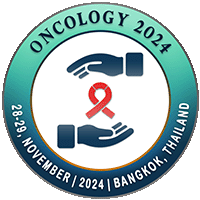.png)
Claudia B. Klein
Yeno Evolution Vienna, AustriaTitle: Biophysical use of signal transduction replacing molecular regulation: Towards a new era of medicine
Abstract
Using the novel biophysical technology, YENO QUANTUM ONE, patented in the USA and Europe, intranuclear access and cell nuclear stimulation via signal transduction of the pure signal, biophysically activated regulatory molecule 31 (RM31) is made possible for the first time. RM31 is the name of an isolated natural molecule that occurs in the human body and is involved in many cellular mechanisms. It uses a specific low electromagnetic zero-gravity photon field frequency, which enables the transformation of the molecule into the signal. This signal can be used for subsequent signal transduction and for the regulation of epigenetic key positions and subsequent ribosomal bioprotein synthesis. Interest in the therapeutic use of electromagnetic fields in oncology is steadily increasing. The exploitation and targeted use of intracellular transport signals plays a significant role in specific therapeutic interventions. This new method has enormous clinical potential in the development of new, highly efficient drugs with few or no side effects, as diseases could ideally be treated with such biophysically activated substances by using only stimulated signals. Mrs Klein will present study results from her pilot study published in March 2022, as well as results from her in-vitro study using HL60 cancer cells and its in-vivo application. The mechanism presented demonstrates inhibition of telomerase activity by 99.5% within 72 hours and apoptosis of tumour cells by 63% in 48h, fibroblast stabilisation and the use of fibroblasts in cancer treatment.
Biography
Claudia Bettina Klein M.Sc./D.I was born in 1972 and is the Developer of the Quantum ONE device and the GENOS method. She studied pharmaceutical chemistry and is a Pharmacologist and Cause Diagnostician. She has 21 years‘experience in the fields of biochemistry, toxicology, homotoxicology, biophysics, cell regulation and epigenetics. Her main research interests are in theoretical biophysics and epigenetics. She has spent the last 8 years researching the cellular mechanisms of information based epigenetics and the possibility of transferring targeted information to cells to alter their biochemical functional processes. Her work encompasses the physiological, biochemical and, above all, holistic cellcommunicative regeneration pathways of the body. She has presented at conferences on cause diagnostics and new medical approaches to disease treatment. She is a member of ISCMR (International Society for Complementary & Medicine Research) and an Honorary member of the Worldwide Association of Female Professionals.

